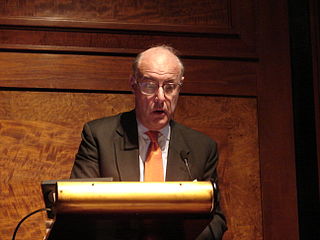A Quote by David Cannadine
Cruel and paradoxical though it undoubtedly is, the record shows that yje most succesful 20th century monarchs have been those who were not actually born to succeed. King George VI was 41 when the abdication of Edward VIII propelled him suddenly and unexpectedly to take up the crown; and Queen Elizabeth II spent her first decade with no inkling thay she herself might one day have to reign. Taken together, these examples suggest that the best preparation for the job of sovereign is not to be prepared for it at all, ir not to be too well prepared for it, or for too long.
Quote Topics
Abdication
Actually
Be Prepared
Been
Best
Born
Century
Crown
Cruel
Day
Decade
Edward
Elizabeth
Elizabeth Ii
Examples
First
George
Her
Herself
Him
Job
King
Long
Might
Monarchs
Most
One Day
Paradoxical
Preparation
Prepared
Queen
Queen Elizabeth
Record
Reign
She
Shows
Sovereign
Spent
Succeed
Suddenly
Suggest
Take
Taken
Those
Though
Together
Too
Undoubtedly
Unexpectedly
Up
Well
Were
Related Quotes
It's this amazing combination to play, really, of somebody who's actually very fragile and hasn't really grown up properly yet - at least in a healthy environment - and has suffered immense loss with her dad - like that line where she says, [in the words of her father [King George VI], "Yes, 'Elizabeth is my pride but Margaret's my joy." She holds onto it!
When a child is born, a father is born. A mother is born, too of course, but at least for her it's a gradual process. Body and soul, she has nine months to get used to what's happening. She becomes what's happening. But for even the best-prepared father, it happens all at once. On the other side of a plate-glass window, a nurse is holding up something roughly the size of a loaf of bread for him to see for the first time.
I think about the kinds of gardens that Queen Elizabeth put up. She made gardens in the shape of an "E," for Elizabeth, just one more way in which she used symbolism to solidify her reign: appearing as the Virgin Queen, for example, or wearing a dress embroidered with eyes and ears to indicate that she knew all that was going on in her castle; she had spies.
I was observing her closely as I talked, and after a while I began to get the impression that she was not, in fact, quite so merry and smiling a girl as I had been led to believe at first. She seemed to be coiled in herself, as though with a secret she was jealously guarding. The deep-blue eyes moved too quickly about the room, never settling or resting on one thing for more than a moment; and over all her face, though so faint that they might not even have been there, those small downward lines of sorrow.
She realized how many of her beliefs were either unrealistic or belonged to her deceased parents and her ex-husband. She also realized that her expectations for herself and others were sometimes too rigid. She was trying to live up to what everyone else said was best for her, which made her depressed and hard to be around at times. Once she changed her beliefs about herself and others, she began to smile more and enjoy life.
Do you know him well?" I ask.I am too curious; I always have been. "Everyone knows Four," she says. "We were initiates together.I was bad at fighting,so he taught me every night after everyone was asleep." She scratches the back of her neck, her expression suddenly serious. "Nice of him." She gets up and stands behind the members sitting in the doorway. In a second, her serious expression is gone,but I still feel rattled by what she said, half confused by the idea of Four being "nice" and half wanting to punch her for no apparent reason.
Suddenly she felt strong and happy. She was not afraid of the darkness or the fog and she knew with a singing in her heart that she would never fear them again. No matter what mists might curl around her in the future, she knew her refuge. She started briskly up the street toward home and the blocks seemed very long. Far, far too long. She caught up her skirts to her knees and began to run lightly. But this time she was not running from fear. She was running because Rhett's arms were at the end of the street.
I know who Queen Elizabeth represents. I know she's the head of the British state. I know she has all sorts of titles in relation to different regiments in the British army. She knows my history. She knows I was a member of the IRA. She knows I was in conflict with her soldiers, yet both of us were prepared to rise above all of that.








































